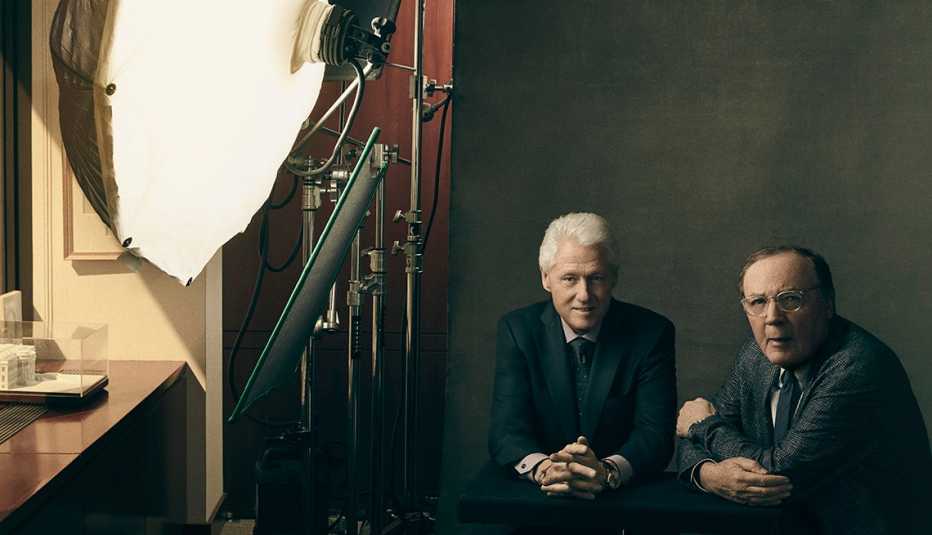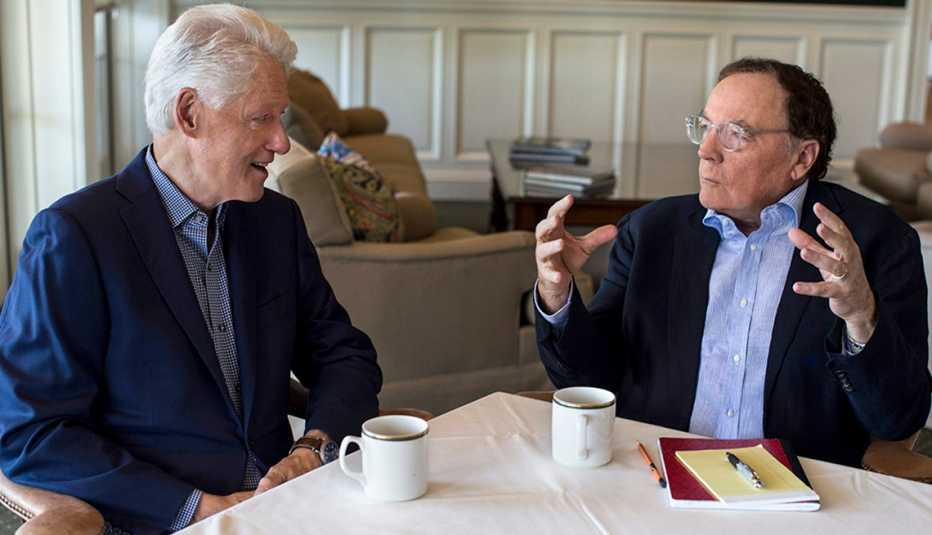AARP Hearing Center


A few years ago, a newspaper asked the novelist and publishing juggernaut James Patterson which writers he’d most like to meet. He replied James Joyce, Bill Clinton and Hunter S. Thompson.
Within weeks, Clinton’s people reached out: The former president would be in Florida, where Patterson lives most of the year. Would Patterson like to meet him? “So we spent a couple of hours down in Boca Raton,” Patterson recalls. “And, I mean, who wouldn’t enjoy the hell out of that? It was an experience of a lifetime for me.”
“I just wanted to meet Jim,” Clinton chimes in. “I read a lot of fiction, and a huge number of political thrillers — I mean, a lot. And I like a series, so I love his Alex Cross series. I love his Michael Bennett series, the idea of an Irish cop with 10 kids — I’m a sucker for that kind of stuff.”
In 2016, when their mutual friend, superagent Bob Barnett, suggested they write a book together, the two men jumped at the chance. Their global thriller, The President Is Missing, hit shelves on June 4.
The gist of the 528-page, 128-chapter potboiler is that — spoiler alert! — a massive cyberattack , called Dark Ages, is about to be unleashed against the United States by parties unknown. The result would be catastrophic, shutting off all our power, wiping all computers, eliminating everyone’s wealth. Five terrible ticktock days ensue — featuring a high-level traitor, a female assassin, and all kinds of word and bullet battles, while the fate of the nation hangs in the balance. Can President Jonathan Duncan save America?
The book should please the fans of both men and then some. Packed with action and the usual Pattersonian red herrings and blind alleys, it also retains a certain dignity, with a presidential voice of Clintonian timbre, no matter how much the two men deny that their fictional President Duncan resembles our 42nd commander in chief. Indeed, nerdy expositions on the details of cyberhacks , international diplomacy and even, yes, the Medicaid coverage gap ensure that readers will very much see the hands of both authors in the prose.
AARP The Magazine executive editor William W. Horne recently sat down with the authors at President Clinton's office in Upper Manhattan. Clinton and Patterson, both 71, were friendly and assured, and the mood was buoyant, even exuberant. The book was essentially done and is super topical: The day before the interview, President Trump nominated the first female CIA director, Gina Haspel; the day after, the Trump administration accused Russia of hacking our power plants and electric systems. In Missing, the FBI and CIA chiefs are women and, yes, a certain superpower is messing with our water and other critical facilities.
Prologue
Q: First, congratulations. I found your book to be a smart, twisty thriller — a terrific read and very contemporary.
Patterson: Don’t be afraid to put that right in the article. [Laughter]
Q: How did the collaborative process work between you two?
Clinton: First of all, Jim’s the greatest storyteller in history. So he didn’t need my help to tell a story.
Patterson: The president’s a great storyteller.
Clinton: Well, I grew up in the last generation of politicians who were born without televisions, and with family members who were highly intelligent but without much formal education. All of my entertainment was storytelling. But Jim’s good like nobody else. So it was his idea that the president is involved in a crisis.
Q: How did you divide up the work?
Patterson: We alternated words—“the,” “man.” [Laughs] No, I don’t think too much about who does what — I don’t know, and I don’t really care. The first draft was like a thriller cartoon. If you’re writing a book about a president and you’re just a writer, you don’t really know what goes on. For me, one of the most valuable things was the president saying, “That’s not accurate — this is how it really works.”
Clinton: I wanted to make sure we got the details right. He said to me, “We’ve got to get the architecture in the White House right — the room to be the right room, the view to be the right view.” Facts matter.
Patterson: So we did drafts; we did different sections together; we worked on the research. We also had research and some writing help from a lot of people. And we just kept working to make it more and more real. I think a lot of people are going to read this and say, “This thing is so authentic.”
Clinton: He’d ask, “If you were going to go off the grid for a while [as President Duncan does], how would you do it?” Then what I was trying to do at the end, once we got all the externals right, was make sure that the voice of the president in the book was the way a serious person, a real president, would look at it and respond to all this incoming crap. And we tried to make him [realistic] so you don’t forget the president is a human being — who loves his daughter, has an illness and all that.
Q: But the book, overall, is a little more dispassionate than the usual James Patterson adult fiction. No torrid romances ...
Patterson: Sex didn’t play a part. [It was about] five incredibly difficult days. Romance makes no sense, and we don’t need it.
Q: How much Clinton is in this book?
Patterson: Duncan is not Clinton. And obviously, it’s not a memoir. But it is what a lot of people want when they read a memoir. They want to know what it’s like. So what we have is what it would be like if something this serious happened — five terrible days in the life of this flesh-and-blood human being.
The Plot Thickens
Q: How did you settle on a cyberattack involving the president?
Clinton: I’ve been worried for 20 years that we’d always be half a step slow on this cyberwar stuff. In the current climate, all this cybertalk has been about the politics of who hacks what emails and all of that. I’m afraid [people will think] these hacks, with the colorful people involved, like Chelsea Manning, are dramas that are three steps removed from them, that it doesn’t really affect our lives. If the lights go out, it will. If you really think about the implications of what somebody who wanted to harm us could do, it’s about way more than elections. This is about the way I live, my children’s future, everything.
Patterson: We are not prepared for what’s possible. I find it to be one of the scariest threats we face today.
Clinton: Another of our goals [was] to remind people that campaigns may be theater, but the job is a real job. And Jim said he wanted to help restore the respect for the presidency.
Patterson: For 20, 30 years, most of the fictional material that comes out makes fun of presidents — Saturday Night Live, Scandal — and then there’s House of Cards, where the president is out killing people. In theory, making fun of the presidency would be OK, except that’s all we’re getting. So [I wanted to write] something that reminds people of how difficult this job is, how stressful and how important. This is a president we should all agree on — he’s not President Clinton. We don’t really even know what party he belongs to. We never say —
Clinton: By the end of the book, it’s pretty obvious.
Patterson: — but whatever party, this is a good president, this is an example of a president we could all be happy with, whether we’re right, left, middle.


Fact or Fiction?
Q: The opening scene is the president being put through a brutal mock impeachment hearing. Was that a blast from the past?
Clinton: No. What [you take away from the impeachment scene,] if you’re a student of the presidency, is that you have to prepare for these attacks on you. And the way that plays out in the book is quite realistic.
Patterson: And it’s important to the book, to the story, that we capture the hostility that exists in Washington.
Clinton: Look, man, the politics of personal destruction and assassination has been richly rewarded by the voters and loved by the people who give it coverage. It’s just the way it is. And also keep in mind a fundamental difference. The charges leveled in the book [that the president conspired to save the life of a most-wanted terrorist], if true, if true, would be an impeachable offense. That’s totally different from me. So we tried to make it as educational as possible, without losing the entertainment.





























































More on entertainment
Remembering Robert Kennedy
50 years after RFK’s death, his photographer reflects on that tragic day